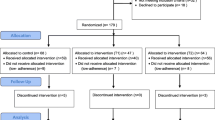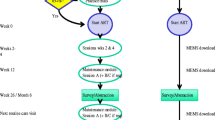Abstract
Placebo medication regimens may help educate students about adherence issues. In this randomized trial, 23 third-year medical students took a 2-week placebo regimen mimicking highly active antiretroviral therapy (HAART) during their medicine clerkship; 15 students served as controls. Although no effect was demonstrated from this intervention on an evaluation instrument examining attitudes and beliefs about medication nonadherence, all 23 student-subjects agreed in postintervention interviews that the experience was useful and had learning value. Representative comments from the 19 subjects who expanded their interview responses portray this intervention as an eye-opening and unique method for teaching students about medication adherence issues.
Similar content being viewed by others
References
Corda RS, Burke HB, Horowitz HW. Adherence to prescription medications among medical professionals. South Med J. 2000;93:585–9.
Greenstein S, Siegal B. Compliance and noncompliance in patients with a functioning renal transplant: a multicenter study. Transplantation. 1998;66:1718–26.
Donovan JL, Blake DR. Patient non-compliance: deviance or reasoned decision-making? Soc Sci Med. 1992;34:507–13.
Gallant JE, Block DS. Adherence to antiretroviral regimens in HIV-infected patients: results of a survey among physicians and patients. J Int Assoc Physicians AIDS Care. 1998;4:32–5.
Knobel H, Carmona A, Lopez JL, et al. Adherence to very active antiretroviral treatment: impact of individualized assessment [in Spanish]. Enferm Infecc Microbiol Clin. 1999;17:78–81.
Bartlett EE, Higginbotham JC, Cohen-Cole S, Bird J. How do primary care residents manage patient non-adherence? Patient Educ Couns. 1990;16:53–60.
Steele DJ, Jackson TC, Gutmann MC. Have you been taking your pills? The adherence-monitoring sequence in the medical interview. J Fam Pract. 1990;30:294–9.
Morse EV, Simon PM, Balson PM. Using experiential training to enhance health professionals’ awareness of patient compliance issues. Acad Med. 1993;68:693–7.
Blackwell B, Griffin B, Magill M, Bencze R. Teaching medical students about treatment compliance. J Med Educ. 1978;53:672–5.
Rudd P, Bell D, Eshima I. Medication noncompliance: a randomized trial for primary care skill instruction. J Med Educ. 1981;56:59–61.
Kastrissios H, Flowers NT, Blaschke TF. Introducing medical students to medication noncompliance. Clin Pharmacol Ther. 1996;59:577–82.
Author information
Authors and Affiliations
Corresponding author
Additional information
The authors have no conflicts of interest to report.
Rights and permissions
About this article
Cite this article
Sutton, E.L., Transue, E.R., E., S.C. et al. Placebo HAART regimen as a method for teaching medication adherence issues to students. J GEN INTERN MED 20, 541–545 (2005). https://doi.org/10.1111/j.1525-1497.2005.0096.x
Accepted:
Issue Date:
DOI: https://doi.org/10.1111/j.1525-1497.2005.0096.x




